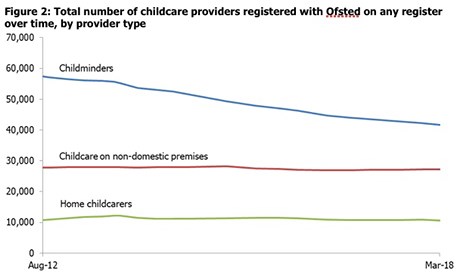Childminder numbers drop by 600 in three months
Wednesday, June 27, 2018
Ofsted statistics show the number of childminders registered with Ofsted has continued to decrease.

The latest Ofsted statistics on ‘Childcare providers and inspections’ to 31 March 2018 show there are 600 (1.4 per cent) fewer registered childminders than at the end of December 2017, and 15,700 (27 per cent) fewer than at 31 August 2012.
Childminders offered 19 per cent, or 252,100, of all childcare places as of 31 March 2018, a decrease of 2 percentage points since August 2012, according to the data.

However, although the previous set of Ofsted statistics, for the period 1 September to 31 December 2017, showed a drop in numbers of both nurseries and childminders, the latest set of data suggests the number of non-domestic providers (nurseries and pre-schools) has increased slightly since then.
By 31 March 2018 there were 27,200 childcare providers on non-domestic premises, up by just under 50 since 31 December 2017, Ofsted said.
Non-domestic premises provided 80 per cent of all childcare places at the end of March 2018, an increase of 2 percentage points since August 2012, according to the statistics.
The report suggested a slight rise in the number of places in childcare on non-domestic premises could be due in part to the introduction of the 30 hours offer. There were an estimated 294,000 children in a 30 hours place in the autumn term.
Despite decreasing numbers of childminders, the statistics found the overall number of childcare places has remained broadly stable since August 2012, with the rise in places offered by childcare on non-domestic premises resulting in a total increase of over 1,000 places.
As of 31 March 2018, there were 1.3m childcare places offered by providers on the Early Years Register.
The latest statistics also showed the proportion of childcare providers judged to be good or outstanding has remained at 94 per cent.
Chief executive of the Professional Association for Childcare and Early Years (PACEY) Liz Bayram said, ‘Once again, we have lost another 600 childminders in the last term – and well over a quarter (27 per cent) since 2012. It is a bitter irony that during this time, childminders have also seen the ‘grade gap’ with non-domestic providers narrow to only one per cent, with 94 per cent of childminders are now graded “good” or “outstanding”.
‘There is action Government and local authorities could take now to help stop this decline and PACEY is frustrated by the lack of urgent action. Like all small businesses, childminders tell us they need prompt and sustainable payment for the early education entitlement. This doesn’t happen for many of them and, with more now delivering funded places, this is becoming a critical concern.
‘We need more to be done to improve parental awareness and understanding of childminding, so current vacancies are filled and we need unfair policies – like the ban on claiming early education for related children – to be overturned.
‘At a time when there is unprecedented demand for childcare, we should be doing all we can to support new childminders to register and to retain our current childminding community.’
Neil Leitch, chief executive of the Pre-school Learning Alliance, said, ‘While we welcome the news that 94 per cent of early years providers are rated as “good’” or “outstanding”, it is incredibly concerning to see that the number of childminders has continued to decline. To lose 27 per cent of a workforce over less than six years is simply unacceptable, and it beggars belief that the Government has still not seen fit to do anything to tackle this ongoing trend.
‘Childminders offer parents a vital source of quality, flexible care and education and the services they provide are absolutely crucial to the sector as a whole, especially at a time when the Government is trying to expand the childcare offer in this country.
‘As such, we urge the Government to finally take some action on this issue – and addressing concerns over excessive paperwork, substantially increasing hourly funding rates, and crucially, removing unfair rules preventing childminders from claiming funding for related children would be a good start. As this statistics have made clear, simply ignoring the problem is not going to make it go away.'
A Department for Education spokesperson said, 'We want to help more childminders enter the profession, which is why we have invested £3.4million through the Childcare Business Grant Scheme to help with the cost of setting up new childminding businesses.
'The scheme has supported almost 3,500 new childminders to get started since 2016. On top of this, we are helping existing childminders to develop their business skills and forge partnerships with schools so that more people can benefit from this rewarding job.'




